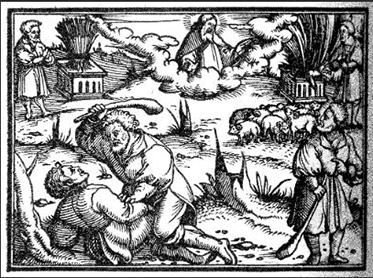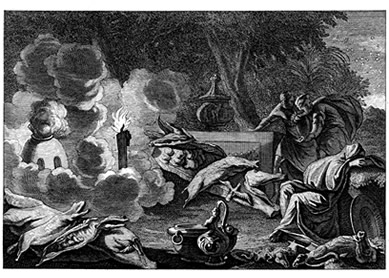The Bible tells of one person, Cain, killing another, Abel, in one of its first stories, the fourth chapter of Genesis (Gen 4:1-16). Cain is the first son of Adam and Eve, and his brother—his only sibling at the time—was Abel. Yet despite the bond of brotherhood, Cain kills Abel. The placement of this story so early in the Bible’s narrative shows that homicide was considered terribly heinous. The horrific nature of killing is revealed by the appalling rupture of family ties when one brother slays another.
The Bible condemns Cain’s act. But generations of readers have wondered what motivated Cain. The text seems to explore this point, and it devotes several verses to exploring Cain’s inner life and the nature of the impulse to sin.
Why did Cain kill Abel?
The biblical text does not explicitly say why Cain killed Abel. It implies that Cain was profoundly chagrined when God preferred Abel’s sacrifice over his and that Cain resented Abel so much that he sought to kill his brother. The details offered about their sacrifices may give a hint as to the differing temperaments of Cain and Abel: Cain makes an offering from “the fruit of the ground,” whereas Abel offers choice portions “of the firstlings of his flocks.” Abel offers his best animals—does this reflect Abel’s more generous nature? Abel could not know if his animals would give birth to more offspring of equal quality, and so Abel’s gift was more openhanded. By contrast, Cain did not offer the most valuable part of his harvest. He was more tight-fisted and less generous, and it is no surprise that a man with a tendency to mean-spiritedness, like Cain, was driven to jealousy.
However, the text does not move directly from Cain’s disappointment to Abel’s murder. Rather, God responds to Cain’s dismay, cautioning him about his consternation and telling him that even if he has done wrong and is susceptible to sin, Cain can withstand the impulse and have mastery over sin. God affirms that Cain’s jealousy need not spiral downward into murder: “Why are you angry, and why has your countenance fallen? If you do well, will you not be accepted? And if you do not do well, sin is lurking at the door; its desire is for you, but you must master it” (Gen 4:6-7). Cain’s character is not such that killing his brother was inevitable.
Yet Cain does kill Abel, and an unusual feature of v. 8 prompts us to reflect on Cain’s motive. The verse reads, “Cain said to his brother Abel…. And when they were in the field, Cain rose up against his brother Abel, and killed him”—what “Cain said to his brother Abel” is omitted in the Hebrew text of the Bible. Cain’s words may have been omitted accidentally by a scribe or omitted intentionally by the storyteller. (Some early translations of the Bible, such as the Septuagint, correct the omission by adding the anodyne sentence, “Let us go out to the field,” and a number of contemporary translations contain this reading.)
Whatever the case may be, the absence of the content of the conversation makes us, as readers, wonder what Cain said to his brother so that the brothers go outside to a field, a dangerous location. Biblical law, in Deut 21, identifies a field as perilous because a killer knows that if a killing occurs there, outside a town or village, there may be no witnesses and no way to determine who the killer is. This chapter in Deuteronomy proposes an elaborate ceremony for the community nearest the location of a corpse found in a field, in order to affirm publicly its innocence while announcing the failure to identify the killer. When Cain speaks to Abel and the result is that they go to a field, Cain’s deadly intentions are revealed.
Why does God question Cain rather than confront him directly about Abel’s murder?
The biblical text does not have God question Cain explicitly about Abel’s murder because it wants to portray Cain’s emotional and psychological complexities and the social context. Cain is not portrayed as a cold and one-dimensional person whose only tendency is to kill other human beings. Rather, Cain is depicted as a man of emotional subtlety and nuance. God has warned Cain about the impulse to sin, emphasizing that it is powerful and tenacious yet can be overcome.
God does not directly confront Cain about Abel’s death, but rather asks Cain indirectly about his brother’s whereabouts. Cain’s emotional outburst, “Am I my brother’s keeper?” (Gen 4:9), indicates that Cain knows what God is really asking him. Cain is unwilling to admit his role in his brother’s death. When God reproaches Cain and decrees his punishment, Cain expresses his shame and despair. His pleas motivate God to mitigate his punishment. God originally decrees that Cain, a farmer, will become alienated from the soil and not be able to farm any longer and that he will have to wander the earth. Cain pleads to God that as a wanderer, anyone will be able to kill him. God then provides a mark as a protection for Cain.
The narrative’s interest in Cain’s inner life reflects the concern of biblical law with the state of mind and motivations of the killer because biblical law makes a distinction between intentional and accidental killing based on the killer’s intentions. The Bible condemns Cain’s killing of Abel and explores Cain’s inner life in order to illuminate what motivated him to commit such a heinous act.




